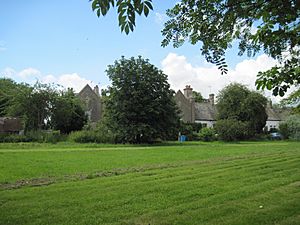Thomas White (1667–1732) facts for kids
Thomas White (born 1667 – died 30 September 1732) was an important English person who owned a lot of land. He was also a Whig politician. This means he was part of a political group called the Whigs. He served as a Member of Parliament (MP) in the English and British parliaments from 1701 to 1732. He lived in a place called Wallingwells in Nottinghamshire.
How Thomas White Found His Home
Thomas White was the son of John White and Jane Williamson. He went to Gray's Inn to study law in 1685. He also studied at Christ's College, Cambridge in 1686.
Thomas White ended up living at Wallingwells because of a happy accident. One night, he was riding his horse home from Sheffield to Tuxford. The roads back then were not like they are today. They were mostly just muddy paths across open land.
It was dark, and Thomas White got lost. He then found an old house with a moat around it. This house used to be a priory, which is a type of religious building.
The house belonged to Richard Taylor. He was a captain in the local army (the Nottinghamshire Militia). He was also a Member of Parliament for East Retford and had been a High Sheriff of Nottinghamshire.
Richard Taylor was very kind and let Thomas White stay the night.
Richard Taylor had a daughter named Bridget, who was 16 years old. Thomas White was 31 at the time. After this meeting, Thomas White became good friends with the Taylor family. He visited them often. He married Bridget Taylor on 28 July 1698.
When Richard Taylor died in 1699, Thomas and Bridget inherited his estates. These included Wallingwells and Buerly. They decided to make Wallingwells their main home. After moving in, Thomas White was given the job of Deputy Lieutenant for Nottinghamshire. This meant he helped the main leader of the county.
Thomas White's Time in Parliament
Thomas White became a Member of Parliament (MP) for East Retford in January 1701. However, he lost his seat after someone complained. This is called being "unseated on petition."
He was elected again in December 1701 for East Retford. He won again in 1702, but was unseated once more in November 1702.
Thomas White did not try to become an MP in 1705. He was busy with local government work. He also helped look into people who might be causing trouble, especially Catholics, because there was a fear of invasion.
In 1708, he ran for MP again in East Retford. He had the support of the Duke of Newcastle and the Whig party. He won the election. In Parliament, he voted to remove Dr. Sacheverell from his position.
He was re-elected in 1710, but again, he lost his seat on 11 January 1711.
Thomas White was elected without anyone running against him in 1715. During the Jacobite rebellion (a time of unrest), he was very active in the Nottinghamshire army. He reported to the new Duke of Newcastle about what the local leaders were doing.
In 1718, he was given an important job as the Clerk of the Ordnance of the Tower. He continued to vote with the Whig party for the rest of his time in Parliament. He was re-elected as an MP in 1722 and 1727.
Thomas White's Family and Legacy
Thomas White died suddenly on 30 September 1732, at his home in Wallingwells. He was 63 years old. He is buried in Tuxford Church. His wife, Bridget, lived at Wallingwells until she died in 1761.
Thomas and Bridget White had five children:
- John White (1699 – 7 September 1769)
- Taylor White (1701–1772)
- Bridget White, who married Sir John Heathcote, 2nd Baronet in 1720.
- Anne White (died 27 February 1744), who married Sir Griffith Boynton, 5th Baronet in 1742. She died soon after her son Griffith was born.
- Mary White (5 February 1710 – 29 September 1785), who never married.
Thomas White was known as a cheerful countryman by his cousin, Lady Mary Wortley Montagu. George Gregory said that Thomas White was a "good friend" and a "useful person" for the country.
 | Misty Copeland |
 | Raven Wilkinson |
 | Debra Austin |
 | Aesha Ash |


